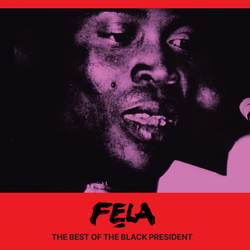
Koola Lobitos (1964-68) / The '69 Los Angeles Sessions (1969)
Artist
Label
Catalogue number
KFR1002-2
Release date
- CD, 3×CD
TRIPLE CD INCLUDES:
Koola Lobitos
A compilation of some of Fela’s pre-Afrobeat singles, recorded between 1965 and 1968. Fela called the music “highlife jazz.” It is uncomplicated, good-time dance music inhabiting a different space than the gritty recordings of the 1970s onwards - though even at his most political, Fela always remained supremely danceable (he might have regarded the title of Funkadelic’s 1970 album Free Your Ass And Your Mind Will Follow as simplistic, but he would likely have agreed with the sentiment). By the time of these Koola Lobitos sides, two of the musicians who would be longstanding cornerstones of Fela’s bands had come aboard: drummer Tony Allen, bandleader until he quit Afrika 70 in 1978, and baritone saxophonist Lekan Animashaun, who took over as bandleader from Allen. Another important Afrobeat pioneer, trumpeter Tunde Williams, joined Koola Lobitos in 1967. Six of the album’s tracks were in 2001 added to the Wrasse (UK) reissue of the Sterns (UK) CD The ’69 Los Angeles Sessions. Originally released by EMI.
The '69 Los Angeles Sessions
A compilation of six singles recorded by Koola Lobitos in Lagos in 1964 and 1965 plus ten previously released Nigeria 70 tracks which, despite the album title, were actually recorded in Los Angeles in February 1970 (see the notes for 1971’s Fela Fela Fela, above). In 1970, Fela had yet to adopt Afrobeat’s signature Broken English lyrics and naggingly mesmeric tenor guitars, but the Los Angeles tracks introduce several of the key characteristics of his mature style of the mid-1970s. Tempos are more measured than before and the beat is heavier. Fela's vocal delivery is earthier and more declamatory. Horn arrangements are more influenced by funk and soul than by highlife's Latin jazz-inspired charts, and on “Wayo” and “Obe” Lekan Animashaun’s baritone riff introduces what later became a recurring Afrobeat motif. The style’s signature rhythms are also present in the iterated phrases played on the rhythm guitar. Originally released by Barclay Frane.











